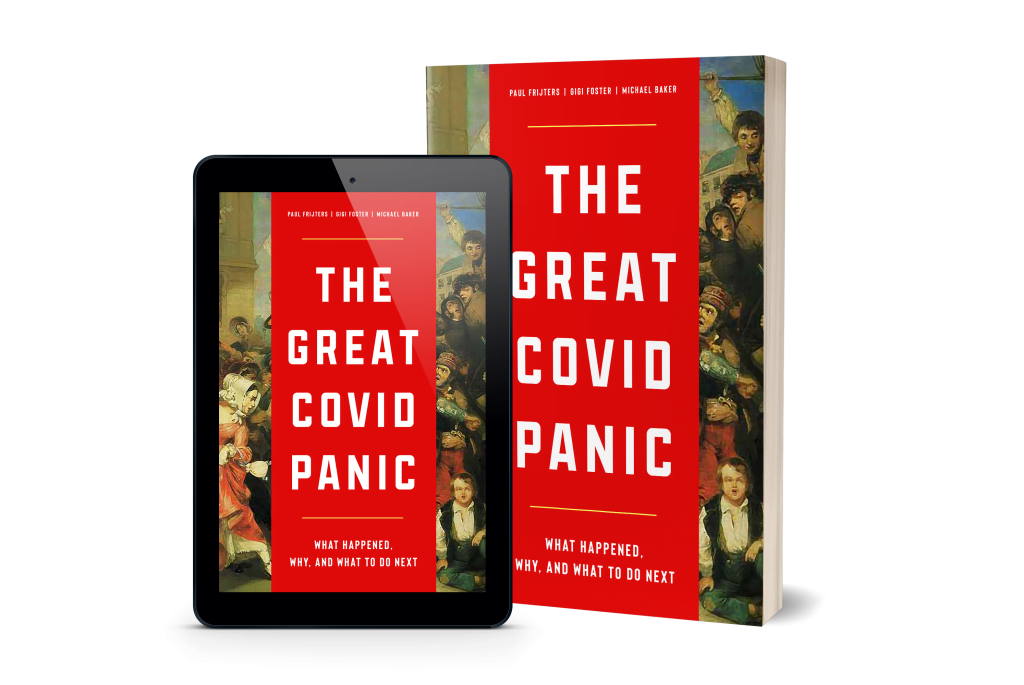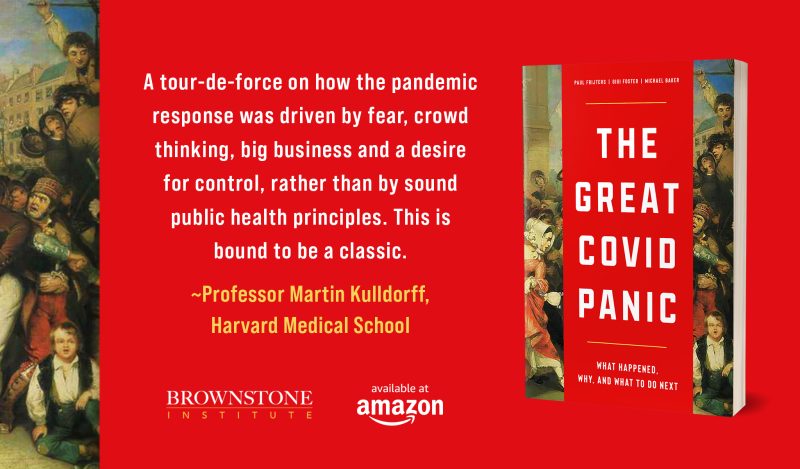The Brownstone Institute is pleased to announce the publication of The Great Covid Panic: What Happened, Why, and What To Do Next, by Paul Frijters, Gigi Foster, and Michael Baker. Combining rigorous scholarship with evocative and accessible prose, the book covers all the issues central to the pandemic and the disastrous policy response, a narrative as comprehensive as it is intellectually devastating. In short, this is THE book the world needs right now.
In the Great Panic of early 2020, nearly every government in the world restricted the movement of its population, disrupted the education of its children, suspended normal individual liberties, hijacked its healthcare system, and in other ways increased its direct control of people’s lives. Attempts to control the new coronavirus in most countries made the number of deaths from both the virus and other health problems higher. Some countries and regions snapped out of the madness in early 2021 or even before. Yet other governments, still in mid-2021, were ever more fanatically obsessed with control.
Why did 2020 become, so suddenly and so forcefully, a year of global panic over a virus that for most people is barely more dangerous than a standard-issue flu virus? This book reveals how the madness started, what kept it going, and how it might end. Join Jane the complier, James the decider, and Jasmine the doubter, the three core protagonists of the narrative part of the book. Their experiences illustrate what happened to individuals and through them to whole societies, telling us — if we care to listen — how to avoid a repeat. This literary presentation is mixed with detailed reports of the actual data and deep research that has generally been obscured in the midst of media madness and obfuscation by public-health authorities.
“A tour-de-force on how the pandemic response was driven by fear, crowd thinking, big business and a desire for control, rather than by sound public health principles. This is bound to be a classic.” ~ Professor Martin Kulldorff, Harvard Medical School
About the authors
Paul Frijters is a Professor of Wellbeing Economics at the London School of Economics: from 2016 through November 2019 at the Center for Economic Performance, thereafter at the Department of Social Policy. He completed his Masters in Econometrics at the University of Groningen, including a seven-month stay in Durban, South Africa, before completing a PhD through the University of Amsterdam. He has also engaged in teaching and research at the University of Melbourne, the Australian National University, Queensland University of Technology, the University of Queensland, and now the LSE. Professor Fritjers specializes in applied microeconometrics, including labor, happiness, and health economics, though he has also worked on pure theoretical topics in macro and micro fields. His main area of interest is in analyzing how socio-economic variables affect the human life experience and the “unanswerable” economic mysteries in life. Professor Frijters is a prominent research economist and has published over 150 papers in fields including unemployment policy, discrimination and economic development.
Gigi Foster is a Professor with the School of Economics at the University of New South Wales, having joined UNSW in 2009 after six years at the University of South Australia. Formally educated at Yale University (BA in Ethics, Politics, and Economics) and the University of Maryland (PhD in Economics), she works in diverse fields including education, social influence, corruption, lab experiments, time use, behavioural economics, and Australian policy. Her research regularly informs public debates and appears in both specialized and cross-disciplinary outlets (e.g., Quantitative Economics, Journal of Economic Behavior and Organization, Human Relations). Her teaching, featuring strategic innovation and integration with research, was awarded a 2017 Australian Awards for University Teaching (AAUT) Citation for Outstanding Contributions to Student Learning. Named 2019 Young Economist of the Year by the Economic Society of Australia, Professor Foster has filled numerous roles of service to the profession and engages heavily on economic matters with the Australian community. Her regular media appearances include co-hosting The Economists, a national economics talk-radio program and podcast series now in its fifth season, with Peter Martin AM on the Australian Broadcasting Corporation’s Radio National.
Michael Baker has a BA (Economics) from the University of Western Australia. He is an independent economic consultant and freelance journalist with a background in policy research. He worked in the 1990s as a policy analyst with the Committee for Economic Development, a New York-based think tank that researched environmental policy, the federal budget and the retirement funding system, among other issues. After moving back to his native Australia in the early 2000s he launched his own consulting business specialising in commercial property economics, consumer demographics and retail. His clients spread across the globe, including Australia, the US, UAE, China and India. In addition to advisory work, he has written frequently for business and trade publications in Australia, the US and Asia. One of his specialties is translating academic research into language comprehensible to the layperson.


From the Book
- The fearful were the perfect victims for those with cooler heads who recognised that this was a unique opportunity to seize power and wealth for themselves. The paralysis of the fearful led in the end to heartless neglect, social disintegration, widespread theft, and totalitarian control.
- The human costs were vast. Children depressed about their worth in life, told that their slightest expression of love and joy could kill their grandparents. Whole populations unhealthier, too afraid to exercise outside or actually prevented from doing so by government edict. Hospitals closed to normal caregiving and surgical procedures cancelled. Mass starvation in poor nations that cost the lives of millions and plunged millions more into misery, caused not by a virus but by active government policies. Hundreds of millions lost their jobs, life roles, freedom to travel and motivation to rise in the morning.
- In these pages we explain what happened, and carefully consider how to avoid a repeat next time — because of course there will be a next time and a next time after that. Only a fool believes that the memory of his own experience will protect future generations.
- The Great Panic illustrated both the tendency of those in power to use fear to extend their control, and the social wave nature of fear itself.
- Covid politicians felt the need to exude utter and complete confidence in the measures they were taking, thereby making true deliberations impossible at the broader societal level. This made their societies, our societies, slow learners and slow adapters.
- From a social perspective, lockdowns are like trying to get humans to act out a reprise of the hunter-gatherer period, isolated in small groups and interacting infrequently. The failures of lockdowns are all related to the impossibility of really trying to live that way again.
Join the conversation:


Published under a Creative Commons Attribution 4.0 International License
For reprints, please set the canonical link back to the original Brownstone Institute Article and Author.









